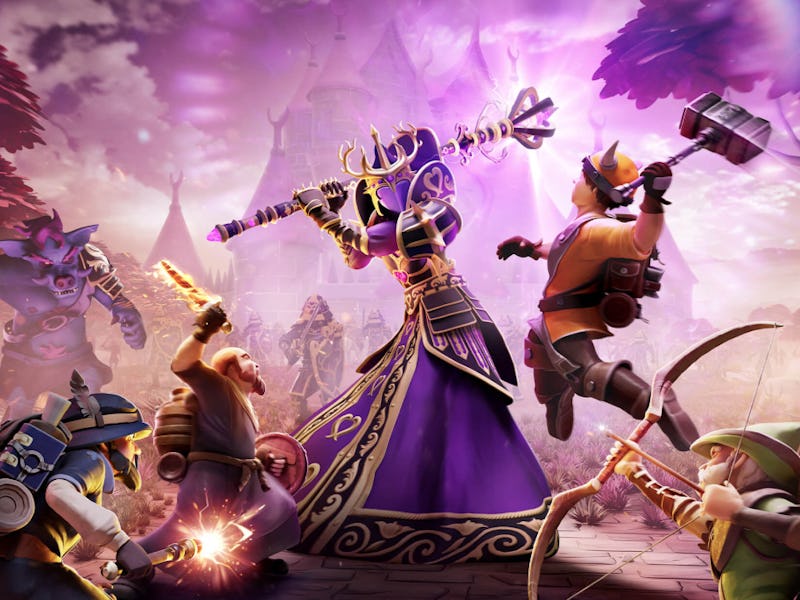For The King 2 Is The Cult Classic RPG Sequel You And Your Friends Have Been Waiting For
This turn-based fairytale shines as a cooperative — but is fun solo, too.

Friendship is a treasure. We don’t often appreciate it enough, especially when we’re young and friends seem to materialize out of thin air in every classroom, playground, or part-time job. As time goes by though, many of us realize how hard it is to maintain those bonds. Especially for folks who love games. Whether it’s tabletops, looter shooters, or fighting games, playing with a friend or two makes the experience so much better. Making this happen IRL can be a challenge, but every now and then a game comes along that manages to capture the spirit of an in-person hang and deliver the camaraderie we crave.
For the King 2, now available on Xbox Game Pass, is just such a game. Sequel to 2018’s indie hit For the King, this follow-up does all the sequel-y things you’d expect. It retains the storybook RPG feel of the original, tasking players to form a band of adventurers in the kingdom of Fahrul out to thwart Queen Rosomon who has taken a mysteriously sinister turn. Along the way there are dozens of procedurally-generated side quests and distractions that will challenge even the heartiest traveller but this time the mechanics are deeper, the aesthetics more refined, and the journey more complex. And, crucially, it is a game that really comes into its own when you bring in your friends.
Improved Aesthetics, Tactics, & Classes
The first thing you'll notice about For the King II is its striking art style. While the original’s low-poly aesthetic was charming, the sequel brings a more detailed, colorful world to life, with lovingly crafted environments and character models that give each setting — from sunlit plains to sinister dungeons — a distinct personality. A fantastic soundtrack also helps get the mood right and makes you feel like you’re telling tales in a rustic tavern.
At its heart, For the King II is still a game about tactical planning, risk management, and cooperative teamwork. Up to four players can team up to tackle quests and fight enemies in turn-based combat. The expanded party size from three to four characters is a welcome change, opening up more opportunities for diverse team compositions and strategies. New classes, skills, and equipment add layers of depth, rewarding experimentation and synergy between party members.
Ain’t no party like an RPG party, cause an RPG party got classes.
The classes are what you’d expect from a classic RPG. The Blacksmith is your tank, and excels in close-quarters combat with high armor and health. The Hunter is your ranged attacker and is great at scouting (and avoiding ambushes.) The Minstrel is a versatile support player who uses music to heal, buff teammates, and debuff foes. The Scholar is your mage, and their devastating area-of-effect abilities help control the battlefield. The Herbalist is the healer that keeps the party alive. How you mix and match these classes will set the tone for what happens next.
Combat Built For Cooperative Play
The combat system has been fine-tuned with more dynamic mechanics, including the ability to chain abilities and coordinate attacks for devastating effects. Battles feel more strategic than ever, requiring careful resource management and long-term planning. And when you fail — as you inevitably will — the roguelike progression ensures that every run feels meaningful, with unlockable content that keeps the experience fresh.
The narrative, though still light compared to many other RPGs, is more cohesive and engaging this time around, with choices that meaningfully impact the world. It’s not just about surviving; it’s about carving your own story in a kingdom teetering on the edge of collapse.
You’ll always be stuck between the clock and your compulsive desire to explore the shiny thing on the map.
While this may sound like one of those RPGs you can tuck into and explore at your leisure, the driving hook of the series is that you only have so many turns to complete each of the five story chapters. There are ways to manipulate this both in the settings and through in-game actions, but the tension never goes away. It's also what makes this so much more fun with friends.
The focus on cooperative play really sets For the King 2 apart from other games in the genre. While you can play solo, the game shines brightest when shared with friends. Communication and coordination are key, whether you’re deciding who gets the last healing herb or how to approach a particularly nasty boss fight. It’s a game that thrives on the chaos of multiplayer sessions and puts those friendships to the test.
For the King 2 is available now on Xbox Game Pass. It’s also for sale on Xbox, PlayStation, and PC.